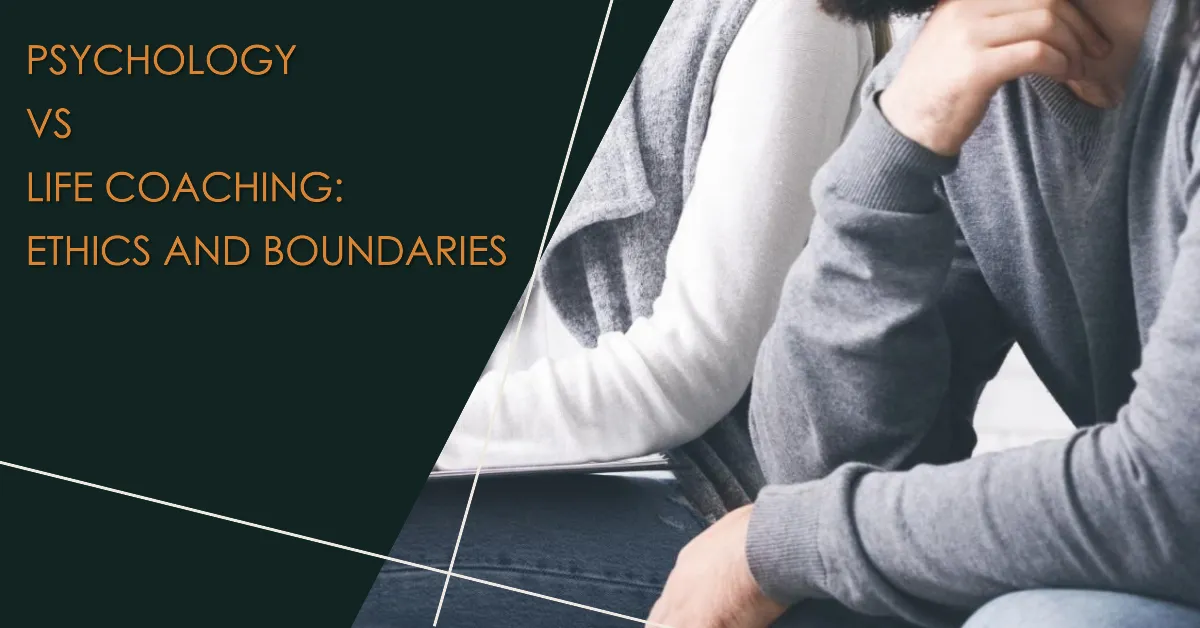Are you searching for a path to personal growth and transformation? Do you feel lost or stuck in your current situation? Look no further than the dynamic duo of life coaching and psychology! While they may seem similar at first glance, these two fields have distinct differences that can help guide you toward achieving your goals.
Let’s start by exploring the goals of life coaching and psychology. Life coaching is all about helping individuals identify and achieve their desired outcomes in various aspects of life, such as careers, relationships, health, and more. Psychology, on the other hand, focuses on understanding human behavior and mental processes to promote wellbeing and alleviate distress. Both paths share a common goal of empowering individuals to live fulfilling lives but with different approaches. By understanding these differences, you can choose the right path for yourself and unlock your full potential.
Table of Contents
Key Takeaways
- Both life coaching and psychology aim to empower individuals to live fulfilling lives but with different approaches;
- Life coaching is more action-oriented, while psychology focuses on scientific research and evidence-based practices;
- Life coaches complete short-term training programs, while psychologists undergo extensive academic training and practical experience;
- Life coaching complements psychology by providing accountability and support for both short-term solutions and long-term personal growth goals.
Understanding the Goals of Life Coaching and Psychology
So, you might be wondering, what exactly are the goals of life coaching and psychology? Well, let’s break it down. Both life coaching and psychology aim to help individuals improve their lives, but they approach this goal in different ways. Psychology focuses on diagnosing and treating mental health disorders, while life coaching is more focused on helping individuals achieve their personal and professional goals.
In psychology, the primary goal is to help individuals overcome any mental health issues they may be experiencing. This can include anxiety, depression, trauma, or addiction among others. Psychologists use various techniques such as cognitive-behavioral therapy (CBT) or psychoanalysis to help clients better understand themselves and develop coping mechanisms for their issues.
On the other hand, life coaches focus on helping individuals realize their full potential by setting clear goals and developing a plan to achieve them. They work with clients to identify strengths and weaknesses, create a vision for the future and develop strategies to overcome any obstacles that may arise along the way.
While both professions have different approaches to achieving these goals, there are similarities between them as well. For example, both psychologists and life coaches emphasize self-awareness as an important tool for achieving success in one’s personal or professional life. By understanding oneself better – one’s values, beliefs, and fears – an individual can make better decisions that align with their goals.
Ultimately whether you choose a psychologist or a life coach will depend on your specific needs. If you’re struggling with mental health issues such as anxiety or depression then seeing a psychologist would be best suited for you. However, if you want to unlock your full potential in your personal or professional life then working with a life coach could provide great value by helping you set clear goals and develop actionable strategies to achieve them!
Methods and Approaches
You may find that the two fields have different methodologies and ways of approaching their clients, which can affect the outcomes of their work. Life coaching is a more action-oriented approach where coaches help clients set goals, develop strategies, and take action to achieve their desired results. This involves using various techniques such as visualization, positive affirmations, and accountability to motivate clients toward success.
On the other hand, psychology focuses on understanding human behavior through scientific research and evidence-based practices. Psychologists use diagnostic tools such as assessments, tests, and interviews to identify mental health issues or disorders. They then use therapeutic interventions such as cognitive-behavioral therapy (CBT) or psychoanalysis to help clients overcome their challenges.
Despite these differences in methodology, both life coaching and psychology share some similarities in how they approach client problems.
Here are four commonalities between the two:
- Both fields believe that individuals have a unique set of strengths and weaknesses;
- Both seek to empower individuals by helping them gain self-awareness and cultivate resilience;
- Both aim to help clients navigate life transitions by providing guidance and support;
- Both focus on creating actionable plans that lead to positive change.
While there are differences between life coaching and psychology in terms of methods and approaches used with clients; both share similar goals of empowering people toward achieving their desired outcomes in life. By understanding these similarities and differences between life coaching vs psychology one can make an informed decision about which approach would best fit their needs for personal growth or professional development goals. So if you’re looking for freedom from limiting beliefs or habits that hold you back from reaching your full potential – whether it be in your career or personal life – consider working with either a certified life coach or licensed psychologist who has experience helping others overcome similar challenges like yours!
Training and Certification
Indeed, both life coaching and psychology have unique paths of training and certification. As a client, it’s essential to understand the professional background of the individual you’re considering working with.
Life coaches typically go through a concentrated training program that hones particular skills such as communication, goal setting, and fostering accountability. These programs, offered by accredited institutions, span from several weeks to months, equipping them with knowledge on coaching ethics, managing clients, and even strategies for expanding their reach.
On the other hand, psychologists embark on an extensive journey of academic training. To become licensed practitioners, they earn at least a master’s degree in psychology or a related field, complemented by internships or residency programs that provide practical experience. The licensing process culminates with passing state examinations.
Despite these differences in training and certification, both life coaches and psychologists share a common objective: to help clients achieve personal growth and success. The method, however, differs. Psychologists often lean on research-backed, clinical interventions while life coaches center on empowering clients using positive reinforcement techniques. These techniques are designed to aid clients in recognizing their strengths and overcoming obstacles in their path.
The decision to seek assistance from a life coach or a psychologist depends on your unique needs and the approach you feel most comfortable with. Both fields offer opportunities for personal growth, but their methodologies and educational backgrounds differ significantly. It’s essential to remember that whichever path you decide on, both professionals have undergone significant training to support and guide you on your journey toward personal freedom and fulfillment.
Clientele
The effectiveness of both life coaching and psychology is highly contingent on understanding the client. Professionals in these fields are trained to tailor their approaches to better serve the unique needs of each client.
Here’s what you can expect:
- Empathy: In any therapeutic relationship, empathy is fundamental. Both life coaches and psychologists strive to understand your feelings and perspectives. This understanding builds trust and rapport, enabling them to communicate more effectively and provide advice that resonates with you.
- Communication style: Just as each person has a unique communication style, so do life coaches and psychologists adapt theirs accordingly. Some clients may prefer direct feedback, while others need gentle guidance. This tailoring of communication styles is aimed at creating an environment that fosters your growth.
- Goals: Recognizing what motivates you is crucial in helping you reach your goals. Whether you aspire to lose weight, improve relationships, or advance in your career, a good life coach or psychologist will take the time to understand what drives you. This understanding allows them to create personalized action plans that cater to your specific needs.
- Personality type: Your personality type may also influence the approach of your therapy or coaching sessions. For instance, introverted clients might find one-on-one sessions more comfortable, while extroverts could benefit from group settings. Life coaches and psychologists should recognize these differences early on, adjusting their approach accordingly.
Whether you choose a life coach or a psychologist, the professional you work with should make an effort to understand your unique needs and personality. This approach ensures the creation of a safe space where you feel empowered and supported on your journey toward self-improvement. Remember, every person is unique, but the desire to overcome limitations and achieve personal freedom is a shared human experience.
Ethics and Boundaries

Ethics and boundaries are fundamental aspects of both life coaching and psychology, shaping the professional-client relationship. As a potential client, it’s important you understand the code of ethics in both fields, as these guidelines not only direct the conduct of the professional but also safeguard your rights.
Both life coaches and psychologists are bound by a code of ethics that ensures they maintain confidentiality, respect your autonomy, and act in your best interest. They should uphold professionalism at all times, striving to establish trust and rapport with you, while also helping you achieve your goals.
On top of that, maintaining appropriate boundaries is a vital aspect of these relationships. This means your life coach or psychologist should not involve you in their personal matters, nor should they allow their relationship with you to become personal. This professional distance protects both parties and maintains the integrity of the helping relationship.
By adhering to these ethical standards, life coaches and psychologists can effectively support you in your growth and transformation journey. It’s essential to feel comfortable and safe with your chosen professional, and understanding these ethics can help reassure you that your best interests are at the heart of the services provided.
Code of Ethics in Psychology
The code of ethics in psychology is a set of rules that every professional must follow to ensure that they operate within ethical boundaries. These principles and standards help to maintain the integrity, trust, and reliability of the profession. It also ensures that psychologists conduct themselves in a way that promotes the welfare and respect for human beings.
It’s important to know that professionals in psychology are held accountable for their actions. The code of ethics is designed to protect you as a client or patient from any unethical behavior by your therapist. When working with a psychologist, you can rest assured knowing that they have undergone extensive training and adhere to strict ethical standards, ensuring that your wellbeing is always at the forefront of their practice.
Code of Ethics in Life Coaching
Indeed, life coaches also adhere to their own code of ethics that outlines the principles and standards to be maintained to ensure ethical and effective guidance.
As a client working with a life coach, here’s what you should expect:
- Life coaches are dedicated to upholding values such as integrity, respect, honesty, and confidentiality. These values form the backbone of their interactions with you, as they seek to empower you and help you achieve your goals.
- Trust is paramount in this relationship, and the code of ethics in life coaching emphasizes the importance of confidentiality. This means that any information you share during coaching sessions should remain confidential, with the only exceptions being legal or ethical obligations to disclose.
- The aim of these ethical guidelines is to ensure that life coaches provide safe, secure, and effective coaching. They help create an environment conducive to lasting change and allow you to lead a fulfilling life. So, when choosing a life coach, be assured that they are bound by these ethical standards designed to protect and benefit you.
Maintaining Boundaries and Professionalism
As a client seeking the assistance of a coach or therapist, it’s crucial to understand the boundaries that professionals establish to maintain a healthy and productive relationship. Here’s what you should expect:
- Setting expectations: Even before the first session, your coach/therapist should clarify the type of coaching services they offer and what you can expect from the relationship. This upfront communication helps align your expectations with the services provided.
- Written contract: It’s standard practice to have a written agreement detailing the specifics of the coaching arrangement, including fees, scheduling, and confidentiality terms. This contract ensures there are no misunderstandings or surprises later on.
- Maintaining personal space: Your coach/therapist should keep conversations focused on professional topics related to your coaching goals. If the conversation begins to veer into overly personal territory or areas outside their expertise, the coach will guide the discussion back to the main objectives.
- Self-care of the coach: Good coaches and therapists understand the importance of their own wellbeing to maintain a high level of service. This means they take the time for rest, exercise, and activities outside of work that bring them joy and fulfillment. A coach or psychologist who can’t take proper care of themselves will be more likely to mess up with their patients. Although you probably won’t be able to verify what your coach/psychologist does in their spare time, you can clearly recognize the signs of them being overworked, stressed, or not being able to concentrate properly. Such symptoms might indicate that they are in a bad mental condition themselves and you should address that directly and ASAP.
Following these guidelines, both life coaches and psychologists create a strong, ethical foundation for their practice, which benefits both them and you as a client. Remember, maintaining boundaries isn’t just essential for building trust between you and your coach/therapist, but it’s also crucial for preserving their wellbeing and ability to provide high-quality support.
Complementary Aspects
As you delve deeper into the complementary aspects of life coaching and psychology, it becomes clear how their unique approaches can work together to provide a more holistic understanding of one’s self and behavior. While psychology focuses on diagnosing and treating mental health disorders, life coaching takes a proactive approach by helping individuals identify their strengths, goals, and obstacles in order to achieve personal growth. By combining the two disciplines, clients can gain greater insight into their thoughts and behaviors while also developing concrete strategies for achieving success.
One way that life coaching complements psychology is by providing accountability and support. A life coach can help clients stay motivated as they work toward their goals, providing encouragement and guidance along the way. Moreover, life coaches often focus on specific areas such as career development or relationships, which allows them to provide targeted advice that complements psychological treatment.
Another aspect of life coaching that complements psychology is its emphasis on positive thinking and goal setting. Unlike traditional therapy which may focus on healing past traumas or negative emotions, life coaching centers around creating a positive vision for the future. By setting achievable goals and focusing on positive outcomes instead of dwelling on problems or failures from the past, clients are able to gain greater confidence in themselves and their abilities.
In essence, the complementary nature of these two fields allows for a more comprehensive understanding of one’s self and behavior. By working with both a psychologist and a life coach simultaneously, individuals can receive support for both short-term solutions as well as long-term personal growth goals.
The following table summarizes some key differences between psychology and life coaching:
| Psychology | Life Coaching |
|---|---|
| Focuses on diagnosing & treating mental health issues | Takes a proactive approach toward achieving personal growth |
| Uses evidence-based methods & techniques | Emphasizes individual empowerment & choice |
| Typically requires insurance coverage or out-of-pocket expenses | Can be more affordable than traditional therapy |
| May involve medication management or hospitalization | Does not involve medical treatment or diagnosis |
As you can see, while there are some differences between these two fields, they also share many complementary aspects. By combining the strengths of both psychology and life coaching, individuals can achieve a greater sense of self-awareness and personal growth. So if you’re looking to make positive changes in your life, you may consider working with both a psychologist and a life coach to help you on your journey toward freedom, fulfillment, and better mental health.




